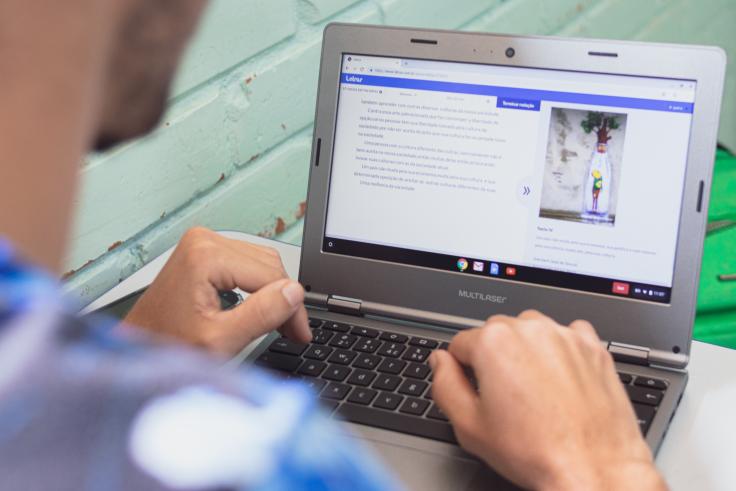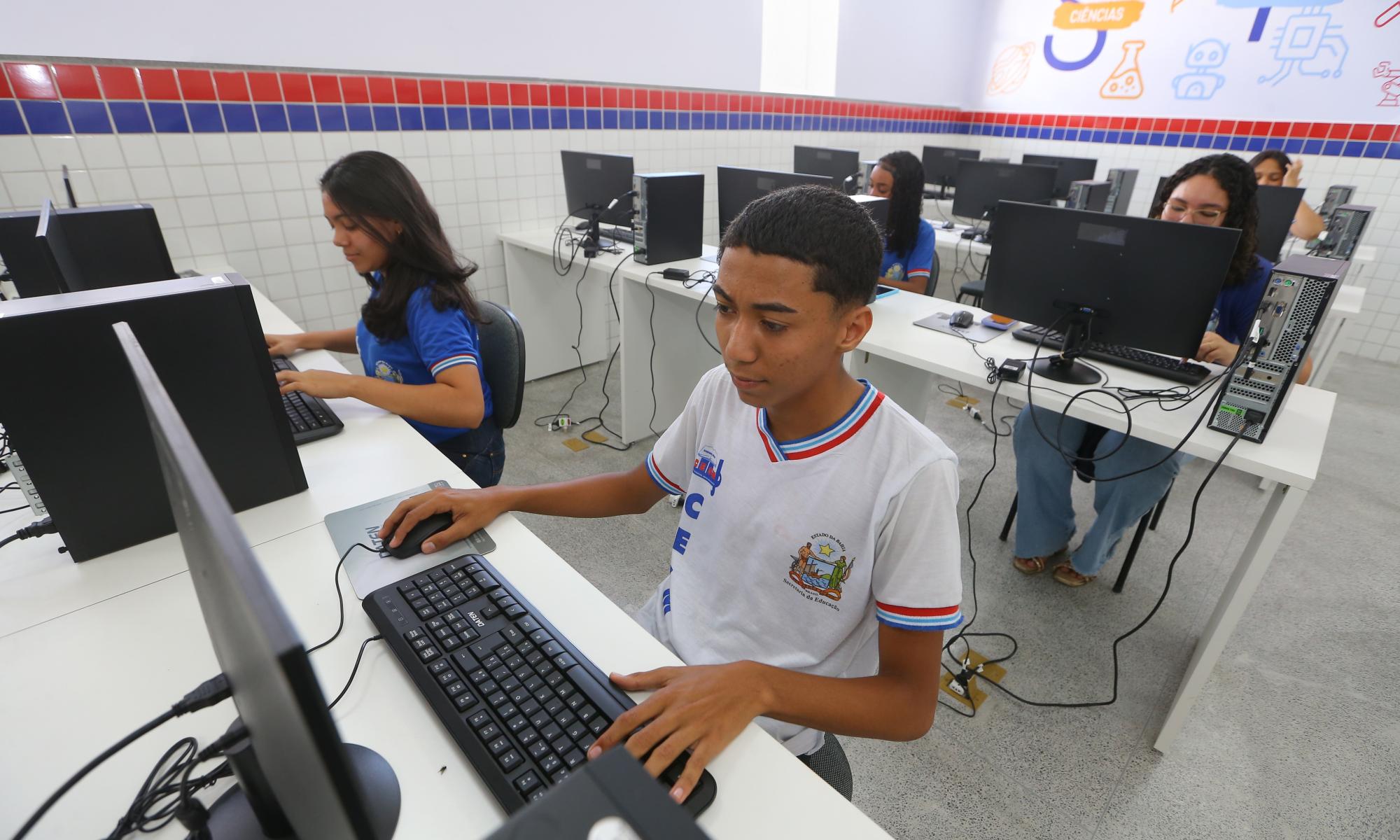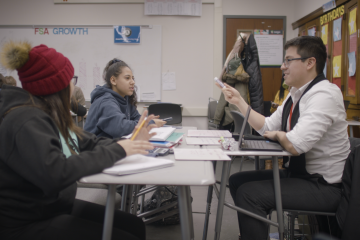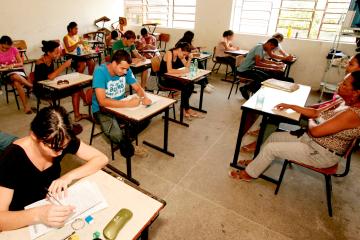
An AI-powered editing tool gave students personalized feedback and helped teachers spend more of their time one-on-one with students.

Carefully designed and tested AI tools can improve student learning by helping teachers focus their limited time on high-impact instruction. An AI-based essay grading tool eased teachers’ workloads and allowed more time for direct engagement with students. When designed and deployed responsibly, AI tools like these can be especially useful in places where teacher shortages and large class sizes are common.
AI tools can be leveraged to solve specific problems, but responsible deployment and evaluation is essential to measure impacts and scale up what works. AI is not a universal solution. Governments and funders should focus on identifying and testing AI applications in education that are designed to address specific challenges, making sure all solutions are context-appropriate and centered on teachers’ and students’ needs.
Public education systems around the world are under strain. Teachers bear the burden of doing more with fewer resources. In Brazil, limited resources for public education lead to persistent performance gaps: Public high school students tend to score lower than their private school peers on the writing section of the national college entrance exam. These gaps can translate into unequal access to higher education. Individualized support for students can help, but is time-consuming for public school teachers to provide.
An AI-powered feedback platform helped teachers spend more time on individual feedback and instruction. A randomized evaluation of an AI platform that provided essay feedback for high school students in the Brazilian state of Espirito Santo found notable gains in students’ writing. While the AI tool, Letrus, didn’t perfectly match teachers’ abilities to provide feedback, it flagged grammatical mistakes and sped up other routine editing tasks. With AI handling these basic elements, teachers spent more time discussing substantive feedback with students one-on-one, where their expertise has the greatest impact.
Students who used the platform wrote more and wrote better, narrowing performance gaps between public and private school students. With instant feedback and more time to engage with teachers, students drafted more practice essays and achieved higher scores on the national college admissions exam. After adopting the tool state-wide, the state of Espírito Santo jumped from 11th to 1st place in national writing rankings, and public school students in Espírito Santo closed nine percent of the test score gap with private schools. These results led to a nationwide expansion of the platform.
Education administrators and policymakers should explore how AI can support teachers by taking on time-consuming tasks. The success in Brazil shows that, with the right support and attention to measuring real-world impacts through randomized evaluation, AI can be a valuable tool for improving education delivery.
Cost and design considerations
Human oversight plays a key role in catching errors and preventing unintended harm from AI tools, and should be balanced against the time and cost savings these tools are meant to provide. In Brazil, adding trained graders to review AI-generated feedback on student essays didn’t improve student outcomes. Teachers were able to understand and use the feedback effectively on their own. Still, in settings where teachers or other key users are less equipped to judge AI outputs, closer human review may be worth the extra cost.
At-scale deployment can make AI tools more cost-effective by lowering the cost per student. In Espírito Santo, the state education department decided to fully integrate the program into its high school senior curriculum and included it in the state’s education budget. With support from a foundation and other state governments, the platform is now scaling to reach over one million students across Brazil.
With support from a foundation and other state governments, the platform is now scaling to reach over one million students across Brazil.
Implementing partners and the role of government
Implementers bring deep local knowledge, technical expertise, and a commitment to evaluation and learning as they bring these programs to life. This includes the following collaborators (listed in alphabetical order); this list is not exhaustive.
- Letrus (Brazil)
- Espírito Santo State Education Department (SEDU)
- Khan Academy (Worldwide)
- Quill.org (United States)

Research and public-private partnerships can ensure innovative technologies are designed and deployed effectively, preventing inadvertent harm and guiding smarter decisions on where to invest scarce resources. Policymakers in Espírito Santo partnered with Letrus, the Brazilian education technology company that developed the AI-based writing feedback platform, to test it in their state’s public schools. By collaborating with researchers to rigorously evaluate the program, they helped make sure limited public funding would go toward a high-impact investment. Based on the evaluation’s positive findings, the state scaled the platform to all public high schools to reach more than 100,000 students. The platform has since expanded to reach over one million students.
The role of foreign assistance and philanthropy
Foreign assistance and philanthropy can play complementary roles in identifying, testing, and scaling effective innovations in public service delivery. Google.org funded the randomized evaluation of Letrus in Espírito Santo. The results prompted the state of Espírito Santo to scale the platform statewide in 2022 to reach all public school seniors, citing its cost-effectiveness.
Letrus has since leveraged this evidence to form partnerships with other Brazilian states, with continued support from philanthropic and foreign assistance for evaluations. To assess long-term outcomes, USAID’s Development Innovation Ventures (DIV) funded a randomized evaluation that would have tracked university enrollment and employment outcomes for 100,000 public high school students in the state of Ceará from 2024 to 2026, but was canceled when USAID closed in 2025. These kinds of long-term studies are essential for helping governments make better-informed decisions about where to invest at scale.
Discover more from J-PAL
Will Technology Transform Education for the Better?
Discover more from other sources
Letrus Receives 5 Million Reais from US Government for Study on AI in Education
Rafael Balago, Exame Magazine
Letrus profile
Unreasonable Ventures
From virtual tutors to accessible textbooks: 5 ways AI is transforming education
Andrea Willige, World Economic Forum
Six best digital learning practices rewarded by the UNESCO Prize for ICT in Education
UNESCO
Photos:
(1) Credit: Shutterstock.com
(2) Credit: Letrus



